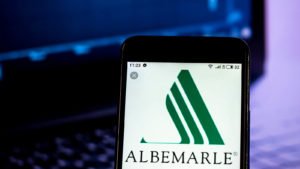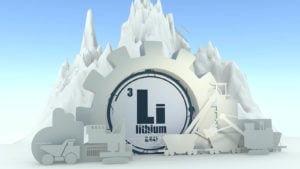Primarily, lithium is a core metal needed for the ongoing transition to electric vehicles (EVs). But it’s also going to be needed for many current and next-gen applications, including flying cars and smartphones.
Investing in commodities is not for risk-averse investors. Oversupply crushed the lithium market, and miners are cutting back. But this tightening of the lithium supply is likely to provide a boost to lithium prices. EV makers, for example, can get through their inventory glut.
Even if turnaround time in lithium prices doesn’t happen soon, many lithium stocks to buy on the dip are trading near 52-week lows. And some pay a dividend which can help protect your investment if the market moves against you.
Albemarle (ALB)

You can’t blame investors for wanting to throw in the towel on Albemarle (NYSE:ALB). At several points in 2023 and 2024, investors may have chosen to get involved, thinking the bottom was in, only to see it fall further.
The good news is that in the last six months, ALB stock looks to have found a floor. The bad news is that it continues to trade at or near that floor. It’s a stock that’s in need of a catalyst.
Albemarle won’t report earnings until May 1, 2024. However, analysts have been upgrading and/or boosting their price targets for the stock in April. Bank of America (NYSE:BAC) upgraded the stock to a buy while increasing the price target from $137 to $156. Wells Fargo (NYSE:WFC) retained its buy rating on ALB stock while raising its price target to $145 from $135.
Frontier Lithium (LITOF)

For investors with more appetite for risk, Frontier Lithium (OTCMKTS:LITOF) is an attractive choice. As of this writing, Frontier Lithium is a penny stock* at just 57 cents. The company’s goal is to be the first fully integrated lithium operation in Ontario.
One important fact for investors to consider is that Frontier Lithium is still a pre-production company that isn’t expected to begin production of any sort at its PAK Lithium Project until 2027. And, Frontier won’t begin lithium chemical production until 2029.
However, the company has a joint venture partnership with Mitsubishi that will help ensure the PAK Lithium Project is funded until production starts. Initially, Mitsubishi will have a 5% stake in the project, which could grow as high as 25%.
WisdomTree Battery Value Chain and Innovation Fund (WBAT)

The WisdomTree Battery Value Chain and Innovation Fund (NYSEARCA:WBAT) is a choice for investors looking to get exposure to lithium without picking one or more individual stocks. This is a relatively new exchange-traded fund that launched in February 2022.
The fund invests nearly equally in China, the U.S. and Japan, with about 16% of the fund’s geographic exposure concentrated in those three countries. As you can see from the name of the fund, it is not a pure-play lithium ETF. You will get exposure to other sectors, including electric vertical take-off and landing (eVTOL) companies (i.e. flying cars) and hydrogen stocks.
That may make the fund too broad for some investors. However, the fund is down 10.68% in 2024, which is better (or less bad) than other ETFs that have a heavier lithium focus. The WBAT fund has $4.08 billion of assets under management (AUM) and carries a 2.63% dividend yield.
*On Penny Stocks and Low-Volume Stocks: With only the rarest exceptions, InvestorPlace does not publish commentary about companies that have a market cap of less than $100 million or trade less than 100,000 shares each day. That’s because these “penny stocks” are frequently the playground for scam artists and market manipulators. If we ever do publish commentary on a low-volume stock that may be affected by our commentary, we demand that InvestorPlace.com‘s writers disclose this fact and warn readers of the risks.
Read More: Penny Stocks €” How to Profit Without Getting Scammed
On the date of publication, Chris Markoch did not have (either directly or indirectly) any positions in the securities mentioned in this article. The opinions expressed in this article are those of the writer, subject to the InvestorPlace.com Publishing Guidelines.
Chris Markoch is a freelance financial copywriter who has been covering the market for over five years. He has been writing for InvestorPlace since 2019.
